Unit 2 Great people Revision Grammar 课件(共23张PPT)
文档属性
| 名称 | Unit 2 Great people Revision Grammar 课件(共23张PPT) |  | |
| 格式 | pptx | ||
| 文件大小 | 860.3KB | ||
| 资源类型 | 教案 | ||
| 版本资源 | 牛津译林版 | ||
| 科目 | 英语 | ||
| 更新时间 | 2022-04-30 10:06:47 | ||
图片预览

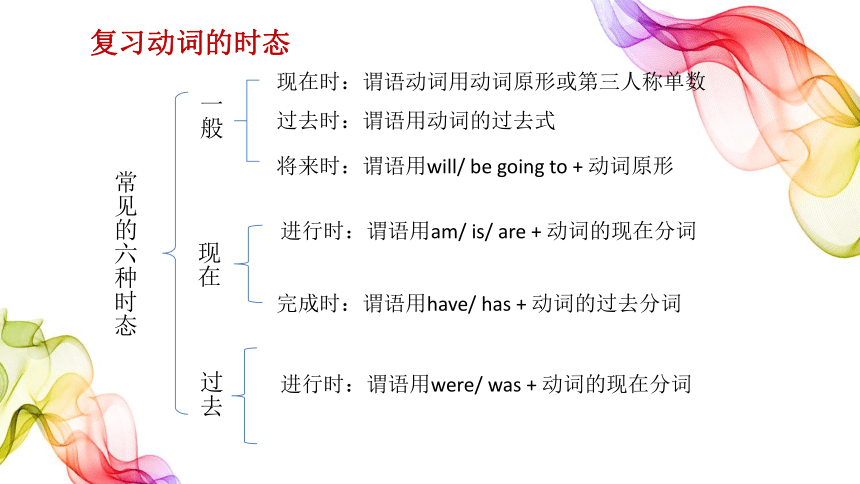
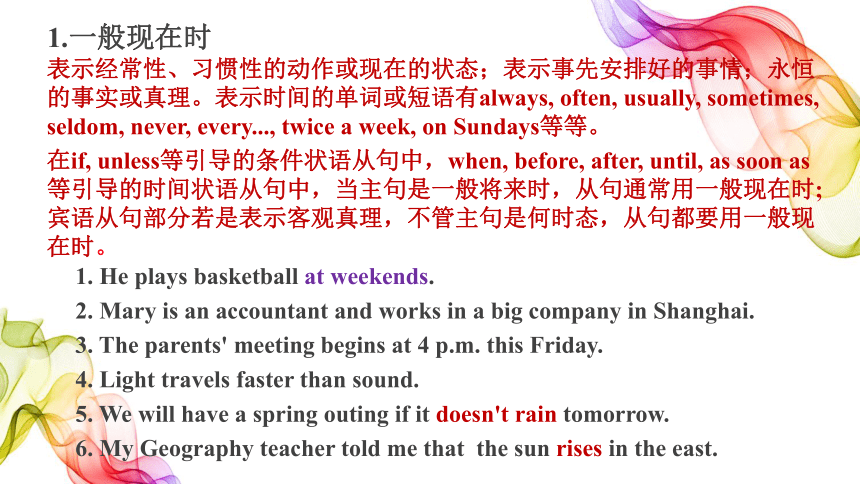
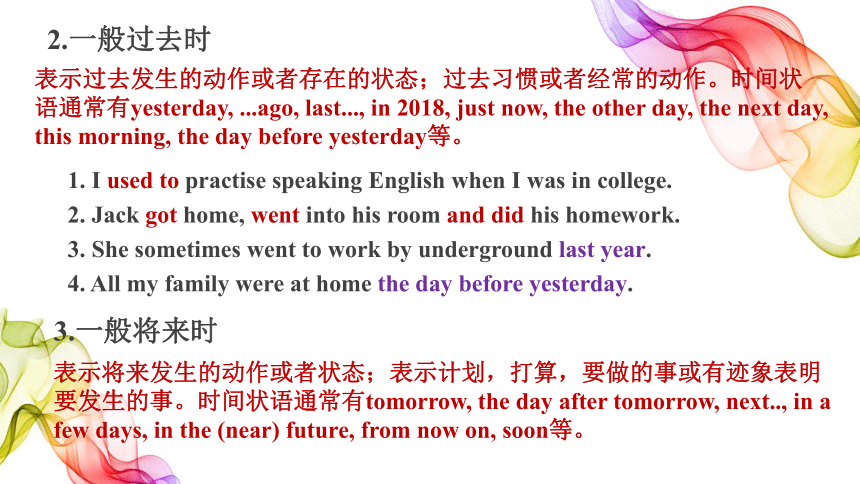
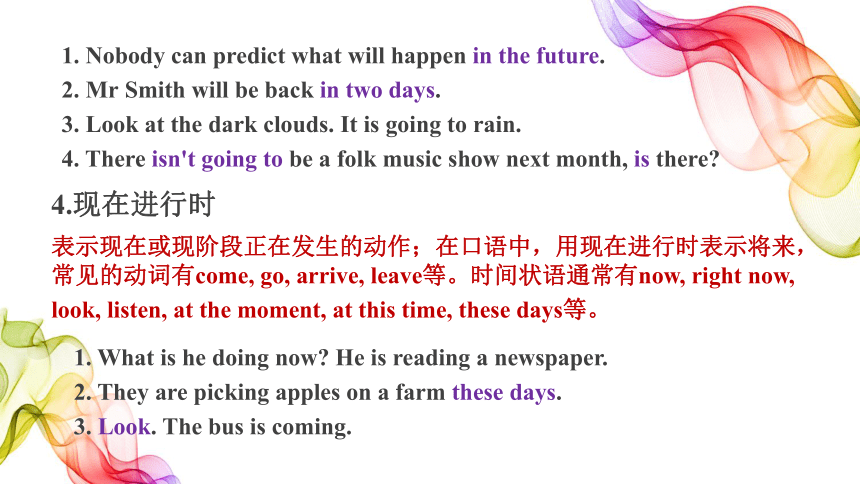
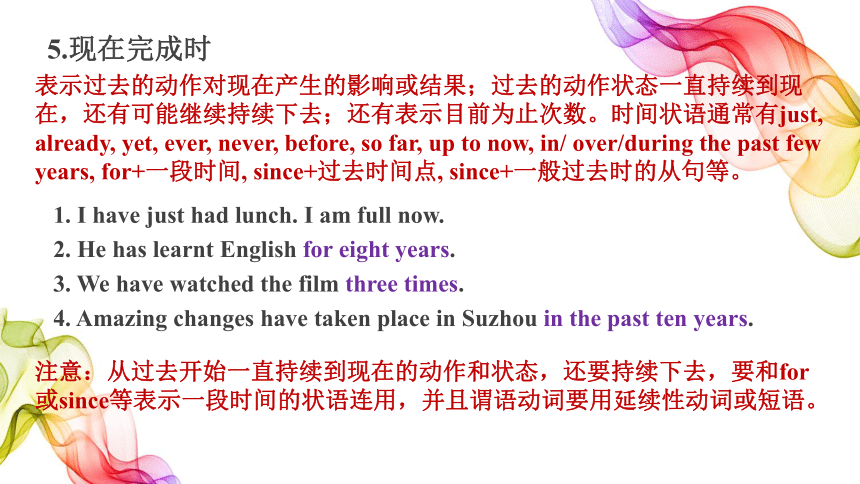

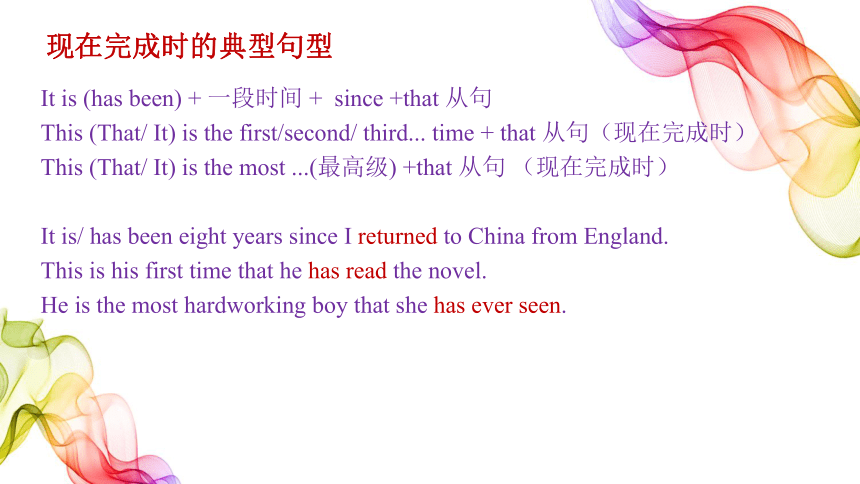

文档简介
(共23张PPT)
9B Unit 2 Revision
(Grammar)
英语
复习动词的时态
常见的六种时态
一般
现在时:谓语动词用动词原形或第三人称单数
过去时:谓语用动词的过去式
将来时:谓语用will/ be going to + 动词原形
现在
进行时:谓语用am/ is/ are + 动词的现在分词
完成时:谓语用have/ has + 动词的过去分词
过去
进行时:谓语用were/ was + 动词的现在分词
1.一般现在时
表示经常性、习惯性的动作或现在的状态;表示事先安排好的事情;永恒的事实或真理。表示时间的单词或短语有always, often, usually, sometimes, seldom, never, every..., twice a week, on Sundays等等。
在if, unless等引导的条件状语从句中,when, before, after, until, as soon as等引导的时间状语从句中,当主句是一般将来时,从句通常用一般现在时;宾语从句部分若是表示客观真理,不管主句是何时态,从句都要用一般现在时。
1. He plays basketball at weekends.
2. Mary is an accountant and works in a big company in Shanghai.
3. The parents' meeting begins at 4 p.m. this Friday.
4. Light travels faster than sound.
5. We will have a spring outing if it doesn't rain tomorrow.
6. My Geography teacher told me that the sun rises in the east.
表示过去发生的动作或者存在的状态;过去习惯或者经常的动作。时间状语通常有yesterday, ...ago, last..., in 2018, just now, the other day, the next day,this morning, the day before yesterday等。
1. I used to practise speaking English when I was in college.
2. Jack got home, went into his room and did his homework.
3. She sometimes went to work by underground last year.
4. All my family were at home the day before yesterday.
2.一般过去时
表示将来发生的动作或者状态;表示计划,打算,要做的事或有迹象表明要发生的事。时间状语通常有tomorrow, the day after tomorrow, next.., in a few days, in the (near) future, from now on, soon等。
3.一般将来时
1. Nobody can predict what will happen in the future.
2. Mr Smith will be back in two days.
3. Look at the dark clouds. It is going to rain.
4. There isn't going to be a folk music show next month, is there
4.现在进行时
表示现在或现阶段正在发生的动作;在口语中,用现在进行时表示将来,常见的动词有come, go, arrive, leave等。时间状语通常有now, right now,
look, listen, at the moment, at this time, these days等。
1. What is he doing now He is reading a newspaper.
2. They are picking apples on a farm these days.
3. Look. The bus is coming.
5.现在完成时
表示过去的动作对现在产生的影响或结果;过去的动作状态一直持续到现在,还有可能继续持续下去;还有表示目前为止次数。时间状语通常有just, already, yet, ever, never, before, so far, up to now, in/ over/during the past few years, for+一段时间, since+过去时间点, since+一般过去时的从句等。
1. I have just had lunch. I am full now.
2. He has learnt English for eight years.
3. We have watched the film three times.
4. Amazing changes have taken place in Suzhou in the past ten years.
注意:从过去开始一直持续到现在的动作和状态,还要持续下去,要和for或since等表示一段时间的状语连用,并且谓语动词要用延续性动词或短语。
误:I have bought the computer since two days ago.
正:I have had the computer since two days ago.
误:They have got married for 15 years.
正:They have been married for 15 years.
常见的非延续性动词作如下变换:
borrow-keep buy-have leave-be away
marry-be married die-be dead come-be in
begin/start-be on finish/stop-be over close-be closed,
open-be open go/come there-be there join-be in/be a member of
catch a cold-have a cold return-be back fall ill/asleep-be ill/asleep
become- be has gone to- has been in put on-wear
现在完成时的典型句型
It is (has been) + 一段时间 + since +that 从句
This (That/ It) is the first/second/ third... time + that 从句(现在完成时)
This (That/ It) is the most ...(最高级) +that 从句 (现在完成时)
It is/ has been eight years since I returned to China from England.
This is his first time that he has read the novel.
He is the most hardworking boy that she has ever seen.
6.过去进行时
表示过去某个时间点或者时间段正在发生的动作;过去两个动作同时进行。时间状语通常有at that time, at this time yesterday, from... to... last night,
when, while, the whole morning等.
1. Simon was having a lesson at 7 p.m. last night.
2. I was doing the word processing from 1 p.m. to 5 p.m. yesterday.
3. Lily was reading a book while Lucy was listening to music.
4. Daniel was playing the violin when I walked past his room.
5. The students were doing their homework the whole morning.
一般现在时和现在进行时的区别
一般现在时强调的是动作的经常性和反复性
现在进行时强调的是动作的暂时性
He listens to the radio every morning.
He is listening to the radio at the monent.
Tips:
Simon has short hair now. He is having bread now.
Jane feels a little tired.
The bag belongs to Susan.
表示感觉和状态的通常用一般现在时。
一般过去时和过去进行时的区别
一般过去时强调的是动作的结束
过去进行时强调的是动作的进行
He drew the painting yesterday. (强调画完)
He was drawing the painting yesterday.(不强调画完)
Tips:
Lily was playing the piano the whole afternoon yesterday.
Lily played the piano three times yesterday.
过去进行时强调的是过去动作的进行
一般过去时强调的是过去的频率,可以与频率副词连用。
一般过去时和现在完成时的区别
一般过去时强调的是过去动作或者状态的结束,和现在没有关系。
现在完成时强调的是过去的动作和现在的关联。
Jack went to Nanjing last month. (阐述去了南京)
Jack has gone to Nanjing. (人在南京,还有可能待在南京)
Tips:
have/has been to 去过人已回
have/has gone to 去了人未回
have/ has been in/at 待在某地
Exercises
( ) 1. — I _____ you here, but you didn’t come.(2018常州中考)
— I'm terribly sorry. I was so busy that I forgot.
A. would expect B. was expecting
C. am expecting D. have expected
( )2. — Have you watched the movie Operation Red Sea?(2018淮安中考)
— Not yet.I it with my friends tomorrow.
A. watch B. have watched C. will watch D. am watching
( )3. The professor reached Nanjing last Wednesday. He there for 10 days.
(2018淮安中考)
A. has been B. has got C. has reached D. has arrived
B
C
A
( )4. The students’ interest in Chinese paper-cut a lot after a folk artist
gave them a talk.(2018南通中考)
A. has risen B. rose C. rises D. was rising
( )5. -Why are you so late today (2018苏州中考)
-Three buses went by without stopping while I at the bus stop.
A. am waiting B. waited C. have waited D. was waiting
( )6.—Great changes have taken place in our hometown over the past years.
—Yeah. Things ______different when we were young. (2018泰州中考)
A. have been B. are C. will be D. were
B
D
D
( )7. —It's a nice day, isn't
— Yes. The sun doesn't shine every day here, but it today.
A. shone B. is shining C. has shone D. was shining
( )8. Very little of the house _________ now because it caught fire last week.
A. remains B. is remaining C. is remained D. remained
( )9. — Daddy, when will we go out to fly a kite
— As soon as your homework _________.
A. will finish B. will be finished C. is finished D. finishes
B
A
C
( ) 10.Nick's brother the navy in 2011 and the navy since then.
A. joined; has joined B. joined; has been in
C. joined in; has been in D. joined in; has joined in
( )11. —It’s said that drinking coffee ____ cancer. Do I have to give it up
—Relax! Not everything on Wechat is true. In fact, a coffee a day keeps
the doctor away. (2018无锡中考)
A. causes B. has caused C. caused D. had caused
( )12. — Mark’s car ______ a cloud of dust as he drove off.
— That’s why we dislike him.
A. raised B. rose C. was raised D. was raising
B
A
A
( ) 13. — Jim looks sleepy in class. What's wrong with him
— He stayed up late last night. He a composition
from 7 o'clock to midnight.
A. wrote B. writes C. has written D. was writing
( )14.—Have you ever visited Russia, Wilson (2019 苏州新区一模)
— Yes, I have. I there last summer for two weeks.
A. went B. was going C. have gone D. goes
( ) 15. — The manager has come back from his business trip. He's asking
you for the report.
— Oh, my god! I haven't finished it yet. But he back at the company
tomorrow.
A. is expected B. expected C. was expected D. will be expected
D
A
C
请根据句意从方框中选择合适的动词,
并用其适当时态填空,使句子通顺。(2018南通中考)
imagine warn beat work match
1. Listen! How heavily the rain _____________ against the car windows!
2. Emily, don’t feed tigers and lions in the zoo. I ___________ you many times.
3. The police have found out that the suspect’s fingerprints ________ those left
at the scene.
4. ─What is Su Ning’s job?
─She’s a manager. But she once _________ as an accountant in a big
company for 5 years.
5. ─Why didn’t you hear me when I called your name in class?
─Sorry, sir. I _____________ how to spend the coming summer holiday.
is beating
have warned
match
worked
was imagining
用动词适当时态填空,使句子通顺(无锡2018)
1. You __________ (promise) to take our boy to Disneyland last year. Don’t
let him down again.
2. The survey shows that few people believe robots _____________ (control)
our planet one day.
3. —You look absent-minded. __________you __________ (expect) someone
—Yes. My e-friend is coming over. We’ve never seen each other before.
4. The only way to do great work is to love what you do. If you _____________
(not find) it yet, keep looking.
5. —Oh dear! My mobile phone has turned into a brick. It’s not working at all.
—Well, it __________ (happen). Take off the battery and put it back on later.
promised
will control
Are
expecting
haven’t found
happens
用动词适当时态填空,使句子通顺(模拟题)
1.If it ____________ (snow) tomorrow , we _______ go to the cinema.
2.Could you tell me if you ___________ (read) the story book before
3.The teacher said that the earth _________ (move) round the sun.
4.I don't know when the manager ___________(return), but when he _______(come) back I ____________(let) you know.
5.We __________ (see) several members of the family since we ________(arrive).
6.I found that the students ____________(play) football on the playground.
7.Look!Someone ________(lie) on the floor.
8.“Where ________(be) you this time yesterday ”
“I________(be) at home. I ____________(go) over my lessons then.”
9.Keep silent !The kids _________________(think ) about a hard problem .
10.Lucy said she ______________(visit) the school the next month.
snows
won't
have read
moves
will return
comes
will let
have seen
arrived
were playing
is lying
were
was
was going
are thinking
would visit
用动词适当时态填空,使句子通顺(模拟题)
1. Two young Chinese names _____________ (shine) brightly at the Beijing 2022
Winter Games: skier Gu Ailing and snowboarder Su Yiming.
2. ---Susan, I’ m busy planting flowers. Can you give me a hand
---Just a minute. I _____________ (tidy) up my desk.
3. Squirrels like saving food, but they forget where it _________ (hide) from time to time.
4. Those who said looking after children was an easy way to make money clearly
_______________ (not meet) such a terrible boy, she thinks.
5. I really regret sharing Teddy’s decision with you, for I thought you ______________
(keep) it a secret.
6. James _____________ (read) the English novel last month, but he still needs four days
to finish it.
shone
am tidying
is hidden
haven’t met
would keep
was reading
Homework
Finish the exercises online.
Thank you!
9B Unit 2 Revision
(Grammar)
英语
复习动词的时态
常见的六种时态
一般
现在时:谓语动词用动词原形或第三人称单数
过去时:谓语用动词的过去式
将来时:谓语用will/ be going to + 动词原形
现在
进行时:谓语用am/ is/ are + 动词的现在分词
完成时:谓语用have/ has + 动词的过去分词
过去
进行时:谓语用were/ was + 动词的现在分词
1.一般现在时
表示经常性、习惯性的动作或现在的状态;表示事先安排好的事情;永恒的事实或真理。表示时间的单词或短语有always, often, usually, sometimes, seldom, never, every..., twice a week, on Sundays等等。
在if, unless等引导的条件状语从句中,when, before, after, until, as soon as等引导的时间状语从句中,当主句是一般将来时,从句通常用一般现在时;宾语从句部分若是表示客观真理,不管主句是何时态,从句都要用一般现在时。
1. He plays basketball at weekends.
2. Mary is an accountant and works in a big company in Shanghai.
3. The parents' meeting begins at 4 p.m. this Friday.
4. Light travels faster than sound.
5. We will have a spring outing if it doesn't rain tomorrow.
6. My Geography teacher told me that the sun rises in the east.
表示过去发生的动作或者存在的状态;过去习惯或者经常的动作。时间状语通常有yesterday, ...ago, last..., in 2018, just now, the other day, the next day,this morning, the day before yesterday等。
1. I used to practise speaking English when I was in college.
2. Jack got home, went into his room and did his homework.
3. She sometimes went to work by underground last year.
4. All my family were at home the day before yesterday.
2.一般过去时
表示将来发生的动作或者状态;表示计划,打算,要做的事或有迹象表明要发生的事。时间状语通常有tomorrow, the day after tomorrow, next.., in a few days, in the (near) future, from now on, soon等。
3.一般将来时
1. Nobody can predict what will happen in the future.
2. Mr Smith will be back in two days.
3. Look at the dark clouds. It is going to rain.
4. There isn't going to be a folk music show next month, is there
4.现在进行时
表示现在或现阶段正在发生的动作;在口语中,用现在进行时表示将来,常见的动词有come, go, arrive, leave等。时间状语通常有now, right now,
look, listen, at the moment, at this time, these days等。
1. What is he doing now He is reading a newspaper.
2. They are picking apples on a farm these days.
3. Look. The bus is coming.
5.现在完成时
表示过去的动作对现在产生的影响或结果;过去的动作状态一直持续到现在,还有可能继续持续下去;还有表示目前为止次数。时间状语通常有just, already, yet, ever, never, before, so far, up to now, in/ over/during the past few years, for+一段时间, since+过去时间点, since+一般过去时的从句等。
1. I have just had lunch. I am full now.
2. He has learnt English for eight years.
3. We have watched the film three times.
4. Amazing changes have taken place in Suzhou in the past ten years.
注意:从过去开始一直持续到现在的动作和状态,还要持续下去,要和for或since等表示一段时间的状语连用,并且谓语动词要用延续性动词或短语。
误:I have bought the computer since two days ago.
正:I have had the computer since two days ago.
误:They have got married for 15 years.
正:They have been married for 15 years.
常见的非延续性动词作如下变换:
borrow-keep buy-have leave-be away
marry-be married die-be dead come-be in
begin/start-be on finish/stop-be over close-be closed,
open-be open go/come there-be there join-be in/be a member of
catch a cold-have a cold return-be back fall ill/asleep-be ill/asleep
become- be has gone to- has been in put on-wear
现在完成时的典型句型
It is (has been) + 一段时间 + since +that 从句
This (That/ It) is the first/second/ third... time + that 从句(现在完成时)
This (That/ It) is the most ...(最高级) +that 从句 (现在完成时)
It is/ has been eight years since I returned to China from England.
This is his first time that he has read the novel.
He is the most hardworking boy that she has ever seen.
6.过去进行时
表示过去某个时间点或者时间段正在发生的动作;过去两个动作同时进行。时间状语通常有at that time, at this time yesterday, from... to... last night,
when, while, the whole morning等.
1. Simon was having a lesson at 7 p.m. last night.
2. I was doing the word processing from 1 p.m. to 5 p.m. yesterday.
3. Lily was reading a book while Lucy was listening to music.
4. Daniel was playing the violin when I walked past his room.
5. The students were doing their homework the whole morning.
一般现在时和现在进行时的区别
一般现在时强调的是动作的经常性和反复性
现在进行时强调的是动作的暂时性
He listens to the radio every morning.
He is listening to the radio at the monent.
Tips:
Simon has short hair now. He is having bread now.
Jane feels a little tired.
The bag belongs to Susan.
表示感觉和状态的通常用一般现在时。
一般过去时和过去进行时的区别
一般过去时强调的是动作的结束
过去进行时强调的是动作的进行
He drew the painting yesterday. (强调画完)
He was drawing the painting yesterday.(不强调画完)
Tips:
Lily was playing the piano the whole afternoon yesterday.
Lily played the piano three times yesterday.
过去进行时强调的是过去动作的进行
一般过去时强调的是过去的频率,可以与频率副词连用。
一般过去时和现在完成时的区别
一般过去时强调的是过去动作或者状态的结束,和现在没有关系。
现在完成时强调的是过去的动作和现在的关联。
Jack went to Nanjing last month. (阐述去了南京)
Jack has gone to Nanjing. (人在南京,还有可能待在南京)
Tips:
have/has been to 去过人已回
have/has gone to 去了人未回
have/ has been in/at 待在某地
Exercises
( ) 1. — I _____ you here, but you didn’t come.(2018常州中考)
— I'm terribly sorry. I was so busy that I forgot.
A. would expect B. was expecting
C. am expecting D. have expected
( )2. — Have you watched the movie Operation Red Sea?(2018淮安中考)
— Not yet.I it with my friends tomorrow.
A. watch B. have watched C. will watch D. am watching
( )3. The professor reached Nanjing last Wednesday. He there for 10 days.
(2018淮安中考)
A. has been B. has got C. has reached D. has arrived
B
C
A
( )4. The students’ interest in Chinese paper-cut a lot after a folk artist
gave them a talk.(2018南通中考)
A. has risen B. rose C. rises D. was rising
( )5. -Why are you so late today (2018苏州中考)
-Three buses went by without stopping while I at the bus stop.
A. am waiting B. waited C. have waited D. was waiting
( )6.—Great changes have taken place in our hometown over the past years.
—Yeah. Things ______different when we were young. (2018泰州中考)
A. have been B. are C. will be D. were
B
D
D
( )7. —It's a nice day, isn't
— Yes. The sun doesn't shine every day here, but it today.
A. shone B. is shining C. has shone D. was shining
( )8. Very little of the house _________ now because it caught fire last week.
A. remains B. is remaining C. is remained D. remained
( )9. — Daddy, when will we go out to fly a kite
— As soon as your homework _________.
A. will finish B. will be finished C. is finished D. finishes
B
A
C
( ) 10.Nick's brother the navy in 2011 and the navy since then.
A. joined; has joined B. joined; has been in
C. joined in; has been in D. joined in; has joined in
( )11. —It’s said that drinking coffee ____ cancer. Do I have to give it up
—Relax! Not everything on Wechat is true. In fact, a coffee a day keeps
the doctor away. (2018无锡中考)
A. causes B. has caused C. caused D. had caused
( )12. — Mark’s car ______ a cloud of dust as he drove off.
— That’s why we dislike him.
A. raised B. rose C. was raised D. was raising
B
A
A
( ) 13. — Jim looks sleepy in class. What's wrong with him
— He stayed up late last night. He a composition
from 7 o'clock to midnight.
A. wrote B. writes C. has written D. was writing
( )14.—Have you ever visited Russia, Wilson (2019 苏州新区一模)
— Yes, I have. I there last summer for two weeks.
A. went B. was going C. have gone D. goes
( ) 15. — The manager has come back from his business trip. He's asking
you for the report.
— Oh, my god! I haven't finished it yet. But he back at the company
tomorrow.
A. is expected B. expected C. was expected D. will be expected
D
A
C
请根据句意从方框中选择合适的动词,
并用其适当时态填空,使句子通顺。(2018南通中考)
imagine warn beat work match
1. Listen! How heavily the rain _____________ against the car windows!
2. Emily, don’t feed tigers and lions in the zoo. I ___________ you many times.
3. The police have found out that the suspect’s fingerprints ________ those left
at the scene.
4. ─What is Su Ning’s job?
─She’s a manager. But she once _________ as an accountant in a big
company for 5 years.
5. ─Why didn’t you hear me when I called your name in class?
─Sorry, sir. I _____________ how to spend the coming summer holiday.
is beating
have warned
match
worked
was imagining
用动词适当时态填空,使句子通顺(无锡2018)
1. You __________ (promise) to take our boy to Disneyland last year. Don’t
let him down again.
2. The survey shows that few people believe robots _____________ (control)
our planet one day.
3. —You look absent-minded. __________you __________ (expect) someone
—Yes. My e-friend is coming over. We’ve never seen each other before.
4. The only way to do great work is to love what you do. If you _____________
(not find) it yet, keep looking.
5. —Oh dear! My mobile phone has turned into a brick. It’s not working at all.
—Well, it __________ (happen). Take off the battery and put it back on later.
promised
will control
Are
expecting
haven’t found
happens
用动词适当时态填空,使句子通顺(模拟题)
1.If it ____________ (snow) tomorrow , we _______ go to the cinema.
2.Could you tell me if you ___________ (read) the story book before
3.The teacher said that the earth _________ (move) round the sun.
4.I don't know when the manager ___________(return), but when he _______(come) back I ____________(let) you know.
5.We __________ (see) several members of the family since we ________(arrive).
6.I found that the students ____________(play) football on the playground.
7.Look!Someone ________(lie) on the floor.
8.“Where ________(be) you this time yesterday ”
“I________(be) at home. I ____________(go) over my lessons then.”
9.Keep silent !The kids _________________(think ) about a hard problem .
10.Lucy said she ______________(visit) the school the next month.
snows
won't
have read
moves
will return
comes
will let
have seen
arrived
were playing
is lying
were
was
was going
are thinking
would visit
用动词适当时态填空,使句子通顺(模拟题)
1. Two young Chinese names _____________ (shine) brightly at the Beijing 2022
Winter Games: skier Gu Ailing and snowboarder Su Yiming.
2. ---Susan, I’ m busy planting flowers. Can you give me a hand
---Just a minute. I _____________ (tidy) up my desk.
3. Squirrels like saving food, but they forget where it _________ (hide) from time to time.
4. Those who said looking after children was an easy way to make money clearly
_______________ (not meet) such a terrible boy, she thinks.
5. I really regret sharing Teddy’s decision with you, for I thought you ______________
(keep) it a secret.
6. James _____________ (read) the English novel last month, but he still needs four days
to finish it.
shone
am tidying
is hidden
haven’t met
would keep
was reading
Homework
Finish the exercises online.
Thank you!
